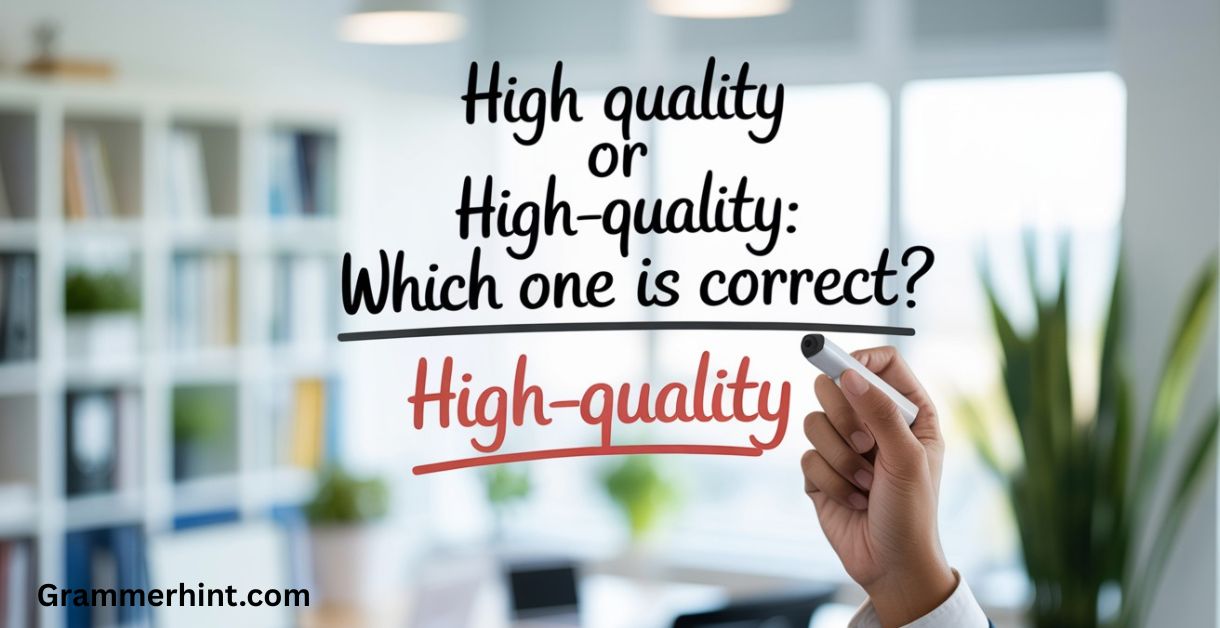English often trips up even the most careful writers, especially when it comes to hyphenation. One of the most common dilemmas is whether to write high quality or high-quality.
Both forms appear frequently, yet their usage depends on grammar rules, sentence structure, and the context in which they are used.
In this article, you’ll get a clear, practical understanding of when to use high quality or high-quality, backed by examples, grammar insights, and a bit of language history. Let’s dive in and clear up the confusion once and for all.
Why Is There Confusion?
English evolves constantly. Words that once stood alone gradually combine, forming compound modifiers and hyphenated expressions. This process hyphenation or hyphen use aims to boost writing clarity and contextual clarity. Yet, it often puzzles writers who wonder: does high quality need a hyphen?
The phrase high quality serves two distinct grammatical purposes: as a noun phrase and as a compound adjective (or quality adjective). The confusion arises because the hyphen signals the phrase’s function in the sentence.
This isn’t unique to “high quality.” Many English phrases change meaning and form based on their part of speech and sentence position. The evolving grammatical usage of English, especially throughout the 19th and 20th-century language trends, has contributed to this uncertainty.
What Does “High Quality” Mean?

As a noun phrase, high quality refers to the standard of excellence or general excellence of something. Here, it acts as a thing or concept rather than describing another noun directly.
- Example: “This product is of high quality.”
- Example: “The high quality of their customer service impressed me.”
In these examples, high quality is the specific noun description—the thing being talked about, the value or worthiness of the product or service.
What Does “High-Quality” Mean?
When high quality functions as a compound modifier or hyphenated modifier, it becomes high-quality. This form acts as an adjective (or descriptor) placed directly before a noun to describe it clearly and precisely.
- Example: “They offer high-quality products.”
- Example: “She received high-quality care.”
The hyphen joins the words, creating a single, unified quality descriptor. This hyphen use prevents confusion by signaling that high and quality combine to modify the noun together.
“High Quality” vs “High-Quality”
When to Use “High Quality”
Use high quality without a hyphen when it acts as a noun phrase. It generally follows prepositions like of, with, or verbs like is or has.
- “Education of high quality is essential.”
- “The reliability and high quality of this device set it apart.”
When to Use “High-Quality”
Use high-quality with a hyphen when it precedes the noun it modifies, functioning as a compound adjective or modifier.
- “We guarantee high-quality craftsmanship.”
- “They specialize in high-quality, premium products.”
The Key Difference
Simply put, high quality (two words, no hyphen) is a noun phrase, while high-quality (hyphenated) is a compound adjective. This distinction aligns with the grammar rule governing hyphenation norms in English.
Synonyms for “High Quality” and “High-Quality”
Synonyms for “High Quality” (Noun Phrase)
- Excellence
- Superiority
- Premium quality
- General excellence
- Standard of excellence
Example: “The general excellence of the materials impressed the client.”
Synonyms for “High-Quality” (Adjective)
- Top-notch
- First-rate
- Superior
- Premium
- Top-tier
- Exceptional
Example: “We provide top-notch customer service.”
Examples in Context
Examples of “High Quality” (Noun Phrase)
- Email example:
Subject: Feedback on Your Service
Dear Ms. Reynolds,
I wanted to commend the high quality of the service I received last week. It truly reflects your company’s dedication to service excellence.
Best regards,
Mark - Conversation:
“Did you notice the high quality of the leather on that jacket? It feels very durable.”
“High-Quality” (Adjective)
- Email example:
Subject: Product Inquiry
Hi John,
We offer a range of high-quality kitchen appliances designed for premium performance. If you want a first-class experience, our latest models won’t disappoint.
Cheers,
Linda - Advertisement copy:
Discover our high-quality, top-tier headphones that deliver superior sound and comfort.
Origins of “High Quality” and “High-Quality”

Origins of “High Quality”
The term “quality” comes from the Latin qualitas, which Roman philosopher Cicero described as the nature or characteristic of something. Over time, English adopted and adapted the term from both Latin and Greek roots (Greek: poiotēs), embedding it deeply into discussions of worth and excellence.
Origins of “High-Quality”
The hyphenated form evolved with the rise of compound modifiers in English. The evolution of English grammar through the 19th and 20th-century language trends encouraged the hyphenation of multiple words modifying a noun to improve writing professionalism and clarity in writing.
A Final Look at “High Quality” and “High-Quality”
Understanding whether to use high quality or high-quality hinges on grasping their grammatical roles. The part-of-speech distinction—noun phrase versus compound adjective—guides the correct hyphenation norms and ensures language consistency.
Remember these quick tips:
- Use high quality (no hyphen) when referring to the concept or standard itself.
- Use high-quality (with hyphen) when the phrase modifies a noun directly as a compound modifier.
This attention to detail boosts precision in writing, avoids common mistakes, and showcases your command over functional grammar. It reflects professional tone and polished grammatical usage that readers appreciate.









